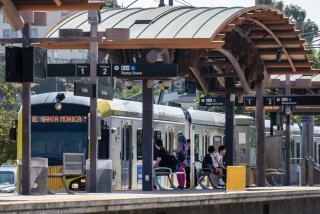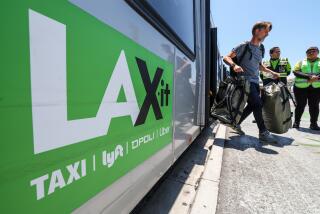More Commuters Let Someone Else Do the Driving
To appreciate the many benefits of Sherry Kelly’s commute by public transit, consider her warm and fuzzy family.
The Hawthorne grandmother of four, who works as an office assistant in Glendale, spends every morning and evening rush hour nestled in her bus or train seat, colored yarn trailing from her fingers as her bamboo knitting needles poke and purl.
“I think I’ve made 10 sweaters in the last two years,” Kelly said, beaming as she recalled how she kept her daughter and grandchildren bundled up this winter.
Since Kelly began taking public transit to Glendale two years ago, she also has shaved hours off her commute. She used to spend two to 2 1/2 hours each way slogging solo through the congestion of the 105, 110 and 5 freeways. Now, even with three connections, her commute takes 1 1/2 hours. She lists other savings, in the thousands of dollars: less gas used, reduced wear on her car, lower auto insurance rates.
“I think more people should try it,” Kelly said. “It’s more relaxing ... and it’s much cheaper.”
With gasoline prices hovering near record highs across the Southland, transportation officials are touting the experiences of commuters like Kelly.
“There’s never been a better time to share the ride,” said David Sutton, the Metropolitan Transportation Authority’s executive manager of commuter services.
Those who can’t forgo their cars every day are urged to try public transit when feasible.
“Relieve yourself [of] the stress of driving,” said Los Angeles City Councilman and MTA board member Antonio Villaraigosa. “When you look at the high cost ... what a great value” the alternatives can be, he added.
Driving solo can be expensive these days. A typical commuter, living 15 miles from work and driving a car that gets 21 miles a gallon, spends $19.43 a day, $408 a month or $4,896 a year on gas, car maintenance, repairs, depreciation and insurance, according to the MTA’s 2004 estimates. The figures assume that the driver pays $2.20 a gallon for gas and $65 a month for parking.
An MTA day pass, allowing unlimited rides on Metro buses and rail lines, costs $3. A monthly pass is $52, or $624 a year.
Commuters who carpool or vanpool typically pay $3.38 a day, or about $71 a month and $852 a year, according to the MTA.
Sam Chakravarti, an engineer who works in Pasadena and lives in Corona, said he was feeling the pain of driving solo. He carpooled for years, but recently his schedule changed. Now his daily 120-mile round trip takes at least four hours -- six when it rains.
So he called (800) COMMUTE, a hotline for people seeking transit or ride-sharing information, so he could be matched to carpoolers with a similar route and schedule. He hopes to squeeze into a vehicle with as many others as he can.
“The more people you have, the less cost you have,” he said. “And if you get sleepy, you can have another driver drive for you. Driving alone is not fun.”
Federal law gives tax breaks to companies that offer employees financial incentives to leave their cars at home. Kelly’s company, for example, pays for her transit passes.
But if public transit or carpooling is not feasible, there are other ways to trim commuting costs, according to the Automobile Club of Southern California:
Slow down and drive gently so your car uses less gas. Ask your employer if you can work from home. Ride a bike. Keep your vehicle lubed and tires properly inflated to maximize fuel efficiency. Combine errands. Shop online.
If you have two cars, use the more fuel-efficient one for commuting, the Auto Club advises.
“There’s carpooling, there’s public transit, there’s a lot people can do,” said Marie Montgomery, a spokeswoman for the Auto Club. “You just got to think a little bit -- about where you’re going and when you’re going.”
For public transit schedules and ride-sharing information, call (800) COMMUTE. An online trip planner is available at www.metro.net. To sign up for a carpool or vanpool, try www.ridematch.info.
More to Read
Sign up for Essential California
The most important California stories and recommendations in your inbox every morning.
You may occasionally receive promotional content from the Los Angeles Times.









